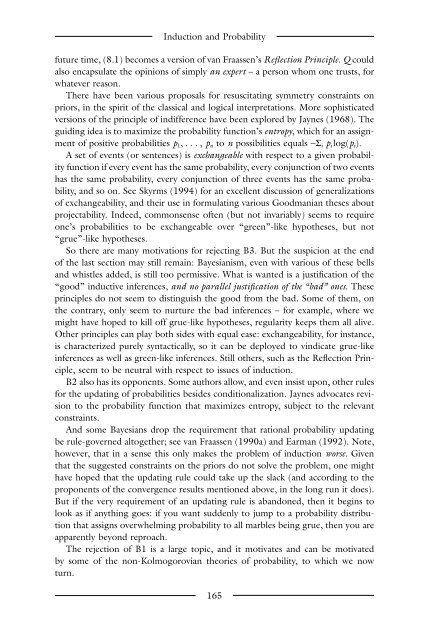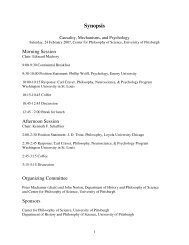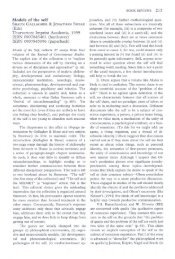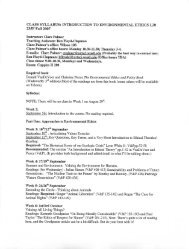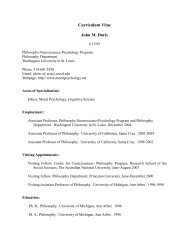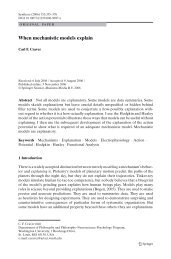The Blackwell Guide to the Philosophy of Science - The Department ...
The Blackwell Guide to the Philosophy of Science - The Department ...
The Blackwell Guide to the Philosophy of Science - The Department ...
Create successful ePaper yourself
Turn your PDF publications into a flip-book with our unique Google optimized e-Paper software.
Induction and Probability<br />
future time, (8.1) becomes a version <strong>of</strong> van Fraassen’s Reflection Principle. Q could<br />
also encapsulate <strong>the</strong> opinions <strong>of</strong> simply an expert – a person whom one trusts, for<br />
whatever reason.<br />
<strong>The</strong>re have been various proposals for resuscitating symmetry constraints on<br />
priors, in <strong>the</strong> spirit <strong>of</strong> <strong>the</strong> classical and logical interpretations. More sophisticated<br />
versions <strong>of</strong> <strong>the</strong> principle <strong>of</strong> indifference have been explored by Jaynes (1968). <strong>The</strong><br />
guiding idea is <strong>to</strong> maximize <strong>the</strong> probability function’s entropy, which for an assignment<br />
<strong>of</strong> positive probabilities p1,..., p n <strong>to</strong> n possibilities equals -S i p ilog(p i).<br />
A set <strong>of</strong> events (or sentences) is exchangeable with respect <strong>to</strong> a given probability<br />
function if every event has <strong>the</strong> same probability, every conjunction <strong>of</strong> two events<br />
has <strong>the</strong> same probability, every conjunction <strong>of</strong> three events has <strong>the</strong> same probability,<br />
and so on. See Skyrms (1994) for an excellent discussion <strong>of</strong> generalizations<br />
<strong>of</strong> exchangeability, and <strong>the</strong>ir use in formulating various Goodmanian <strong>the</strong>ses about<br />
projectability. Indeed, commonsense <strong>of</strong>ten (but not invariably) seems <strong>to</strong> require<br />
one’s probabilities <strong>to</strong> be exchangeable over “green”-like hypo<strong>the</strong>ses, but not<br />
“grue”-like hypo<strong>the</strong>ses.<br />
So <strong>the</strong>re are many motivations for rejecting B3. But <strong>the</strong> suspicion at <strong>the</strong> end<br />
<strong>of</strong> <strong>the</strong> last section may still remain: Bayesianism, even with various <strong>of</strong> <strong>the</strong>se bells<br />
and whistles added, is still <strong>to</strong>o permissive. What is wanted is a justification <strong>of</strong> <strong>the</strong><br />
“good” inductive inferences, and no parallel justification <strong>of</strong> <strong>the</strong> “bad” ones. <strong>The</strong>se<br />
principles do not seem <strong>to</strong> distinguish <strong>the</strong> good from <strong>the</strong> bad. Some <strong>of</strong> <strong>the</strong>m, on<br />
<strong>the</strong> contrary, only seem <strong>to</strong> nurture <strong>the</strong> bad inferences – for example, where we<br />
might have hoped <strong>to</strong> kill <strong>of</strong>f grue-like hypo<strong>the</strong>ses, regularity keeps <strong>the</strong>m all alive.<br />
O<strong>the</strong>r principles can play both sides with equal ease: exchangeability, for instance,<br />
is characterized purely syntactically, so it can be deployed <strong>to</strong> vindicate grue-like<br />
inferences as well as green-like inferences. Still o<strong>the</strong>rs, such as <strong>the</strong> Reflection Principle,<br />
seem <strong>to</strong> be neutral with respect <strong>to</strong> issues <strong>of</strong> induction.<br />
B2 also has its opponents. Some authors allow, and even insist upon, o<strong>the</strong>r rules<br />
for <strong>the</strong> updating <strong>of</strong> probabilities besides conditionalization. Jaynes advocates revision<br />
<strong>to</strong> <strong>the</strong> probability function that maximizes entropy, subject <strong>to</strong> <strong>the</strong> relevant<br />
constraints.<br />
And some Bayesians drop <strong>the</strong> requirement that rational probability updating<br />
be rule-governed al<strong>to</strong>ge<strong>the</strong>r; see van Fraassen (1990a) and Earman (1992). Note,<br />
however, that in a sense this only makes <strong>the</strong> problem <strong>of</strong> induction worse. Given<br />
that <strong>the</strong> suggested constraints on <strong>the</strong> priors do not solve <strong>the</strong> problem, one might<br />
have hoped that <strong>the</strong> updating rule could take up <strong>the</strong> slack (and according <strong>to</strong> <strong>the</strong><br />
proponents <strong>of</strong> <strong>the</strong> convergence results mentioned above, in <strong>the</strong> long run it does).<br />
But if <strong>the</strong> very requirement <strong>of</strong> an updating rule is abandoned, <strong>the</strong>n it begins <strong>to</strong><br />
look as if anything goes: if you want suddenly <strong>to</strong> jump <strong>to</strong> a probability distribution<br />
that assigns overwhelming probability <strong>to</strong> all marbles being grue, <strong>the</strong>n you are<br />
apparently beyond reproach.<br />
<strong>The</strong> rejection <strong>of</strong> B1 is a large <strong>to</strong>pic, and it motivates and can be motivated<br />
by some <strong>of</strong> <strong>the</strong> non-Kolmogorovian <strong>the</strong>ories <strong>of</strong> probability, <strong>to</strong> which we now<br />
turn.<br />
165


